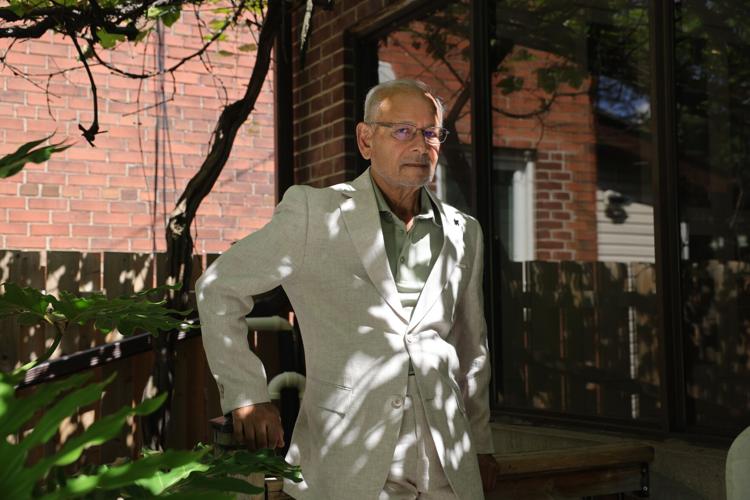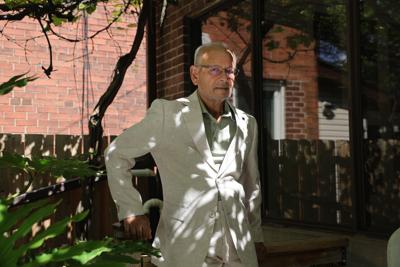A growing chorus of critics are speaking out against the Ontario governmentŌĆÖs expanded police record checks, cautioning that the searches dredge up invasive details that may open the door to discrimination.
The broad record check, brought into force on Jan. 1 for people who work with vulnerable kids, requires police to disclose every contact an individual had with law enforcement that resulted in a written record, including non-criminal encounters such as mental health calls.
Strong protections for vulnerable children are necessary, but the legislative change is a government overreach that gives police too much power and responsibility, a collection of prominent academics say. Some questioned the evidence supporting the sweeping change and said there is no clear indication the move was even necessary to protect children under state care.
ŌĆ£It does not seem to me that there was a good sound examination of what changes were needed before the law was crafted,ŌĆØ said Alok Mukherjee, a human rights advocate and former chair of the civilian board that oversees the ║ŻĮŪ╔ńŪ°╣┘═°Police Service.
ŌĆ£It gives enormous power not only to a police service, but also the individual decision-maker, to affect the lives of people for whom a police records check is required.ŌĆØ
New legislation gives wide discretion to police
The Ontario Human Rights Code prohibits requesting personal information from an employer or applicant unless it relates directly to their essential duties or job requirements. Under the updated legislation, all encounters with police must be disclosed unless the information is ŌĆ£not relevant to the personŌĆÖs suitability to perform caregiving duties for a child,ŌĆØ a clause that grants wide discretion to police.
Mukherjee said itŌĆÖs unclear how a non-criminal police encounter such as a noise complaint would be relevant to a personŌĆÖs employment.
ŌĆ£ItŌĆÖs unnecessary information, it is intrusive and quite possibly in breach of the individualŌĆÖs rights to privacy and non-discrimination.ŌĆØ
The haphazard rollout of the new background checks has caused widespread confusion in the child welfare sector and disrupted critical supports for children and youth.
The Ontario Association of Chiefs of Police (OACP), which represents the provinceŌĆÖs police leaders, was not consulted on the changes before they became law, a spokesperson for the group said. Some police services, including ║ŻĮŪ╔ńŪ°╣┘═°and Ottawa, declined to issue the broad record checks for several months while seeking guidance from police advocacy groups and legal advisers. The OACP last month sent guidelines to police services on how to apply the law to help them develop their own policies and procedures. A ║ŻĮŪ╔ńŪ°╣┘═°police spokesperson confirmed the service is now issuing the new background checks.
The guidelines contain a risk assessment form meant to help police determine whether contact records or non-conviction information should be released. The considerations include whether the police contact raises a clear public safety concern, is directly relevant to the job the person is applying for and is based on reliable sources.

The broad record checks require police to disclose every contact an individual had with law enforcement that resulted in a written record, including non-criminal encounters such as mental health calls.
Randy Risling / ║ŻĮŪ╔ńŪ°╣┘═°StarMukherjee said the guidelines appear to be a sincere attempt to help police services navigate a complex law, but the decision criteria are highly subjective and the advice is optional ŌĆö police forces can choose to make their own rules.
ŌĆ£If it is left to individual officers in different police services to decide if the record is relevant to the position, you will have 10 different answers,ŌĆØ he said.
It should be lawmakers, not individual police services, that create guidelines on what information to release in a record check, and it should be done in consultation with the community, Mukherjee said. Individuals should be assessed ŌĆ£objectively, consistently and without bias,ŌĆØ he said.
Experts question why the change was needed
The new check has also left critics with a nagging question: why was it needed?
Samantha McAleese, a criminology professor at Brock University in St. Catharines who has been researching criminal record checks for more than a decade, said experts in the field were surprised by the legislative change. She and her peers are calling for more government transparency and accountability.
ŌĆ£We donŌĆÖt know what this added layer of check is in response to,ŌĆØ McAleese said.
The Ontario Association of ChildrenŌĆÖs Aid Societies says deeper background checks are resulting in fewer placement options for kids and
The Ontario Association of ChildrenŌĆÖs Aid Societies says deeper background checks are resulting in fewer placement options for kids and
The new check appears to be a performative measure designed to give the appearance of improving safety rather than taking meaningful action to protect children, said Laura Huey, a criminologist and professor at the University of Western Ontario whose research focuses on policing and mental health.
ŌĆ£ItŌĆÖs a bit like security theatre,ŌĆØ she said.
The broad scope of the police contacts that could be included in the check ŌĆö everything from a mental health crisis call to a noise complaint ŌĆö raises equity concerns for people who experience racial profiling and disproportionate police attention, the experts said.
ŌĆ£We know that people who live in socially disadvantaged neighbourhoods and people who are of certain racialized backgrounds are disproportionately likely to come into contact with the police,ŌĆØ said Akwasi Owusu-Bempah, an associate professor of sociology at the University of ║ŻĮŪ╔ńŪ°╣┘═°whose research examines race and criminal justice.
These interactions with police are ŌĆ£often in non-criminal contexts,ŌĆØ such as during wellness checks, mental health crises, missing person reports, child welfare calls, traffic stops, and even as victims or witnesses of crime, Owusu-Bempah said.
ŌĆ£These disproportionate contacts, rooted in systemic inequities, can nevertheless result in individuals having non-conviction or non-criminal records.ŌĆØ
New checks could have ŌĆśchilling effectŌĆÖ on prospective foster parents
The deeper background search may discourage people from becoming foster parents at a time when agencies are facing a placement crisis that has forced some to house kids in budget hotels and office buildings, child welfare leaders have said.
The old background checks were governed by the Police Record Checks Reform Act, which disallowed police from disclosing details on non-criminal interactions with law enforcement. The new background check is exempt from the Act.
The two ministries responsible for creating the new record check did not answer detailed questions about the concerns with the new record check. Instead, a spokesperson for Michael Parsa, the Minister of Children, Community and Social Services, sent a brief statement.

Ontario’s Minister of Children, Community and Social Services Michael Parsa.
Chris Young T/ The Canadian PressŌĆ£Our government will not take any risks when it comes to ensuring the safety of highly vulnerable children and youth placed in the trust of individuals across the child welfare sector,ŌĆØ the statement from spokesperson Chris Clarke said. The legislation that enabled broad record checks ŌĆ£passed with unanimous consent from all political parties in the legislature and came as a result of extensive consultations with the child welfare sector over a number of years,ŌĆØ he added. The ministry has also said the broad record checks will include any outstanding restraining orders against the person or interactions with police under the Mental Health Act.
While the Ontario Association of ChildrenŌĆÖs Aid Societies supports enhanced safety in the sector, it said the rollout of broad record checks has caused disruption and that urgent fixes are needed. The association said the government did not provide agencies with guidance on how the personal information should factor into hiring decisions.
Michael Saini, a professor at the University of TorontoŌĆÖs Factor-Inwentash Faculty of Social Work, said the disclosure of mental health-related police contact information may further reinforce stigma and exclude otherwise capable people from fostering or adopting. It could also have a ŌĆ£chilling effectŌĆØ on potential caregivers considering calling the police for help as they may ŌĆ£fear that their mental health crisis will be used against them in the future.ŌĆØ
Concerns that controversial ŌĆścardingŌĆÖ data will be disclosed
Les Jacobs, one of Canada’s leading experts on human rights and access to justice, said heŌĆÖs concerned that information collected during ŌĆ£street checks,ŌĆØ the controversial police tactic also known as carding, could be released through a broad record search.
Carding is the police practice of stopping, questioning and recording information about individuals who arenŌĆÖt suspected of criminal activity. Widespread in ║ŻĮŪ╔ńŪ°╣┘═°during the late 2000s and early 2010s, street checks led to racial profiling and infringements on civil liberties. During the height of carding in Toronto, black people were subject to street checks at a rate three times higher than white people.
Ontario has since regulated the practice to prohibit street checks without cause, but the ║ŻĮŪ╔ńŪ°╣┘═°police hasnŌĆÖt destroyed the historical information ŌĆö millions of records ŌĆö despite the recommendations of an independent review, said Jacobs, professor and vice president of Research and Innovation at Ontario Tech University.
ŌĆ£Sharing those records would be deeply problematic,ŌĆØ he said.
A ║ŻĮŪ╔ńŪ°╣┘═°Police spokesperson said carding information will not be shared in a broad record check. ŌĆ£TPS members responsible for conducting BRCs do not have access to restricted records, which is what contact cards are considered,ŌĆØ the spokesperson, Stephanie Sayer, said in an email.
The guidelines created by the Ontario Association of Chiefs of Police say law enforcement agencies can release information collected during street checks if certain conditions are met.
Asked about safeguards to prevent discrimination, a spokesperson for the police chiefsŌĆÖ association said that itŌĆÖs an issue not ŌĆ£with police policies but with government regulations.ŌĆØ
Spokesman Jos├® Lu├Łs Couto said questions about the impact of the new disclosure requirements ŌĆ£should be referred to the provincial government.ŌĆØ







































To join the conversation set a first and last name in your user profile.
Sign in or register for free to join the Conversation